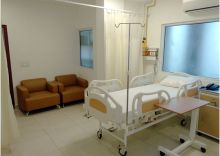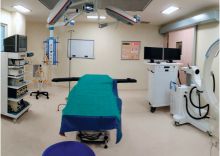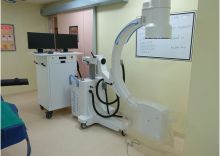The ACL (anterior cruciate ligament) is an important ligament found inside your knee joint.
It connects the thigh bone (femur) to the shin bone (tibia) and plays a vital role in providing stability and preventing excessive forward movement of the tibia.
Injuries to the ACL are common, especially in sports activities that involve—
- Sudden stops
- Changes in direction
- Direct impact to the knee.
Symptoms of an ACL injury include—
- Pain
- Swelling
- Instability
- Difficulty carrying weight on the injured leg
Treatment options for an ACL injury vary depending on the severity and individual circumstances.
Non-surgical treatments may involve—
- Rest
- Physical therapy
- Use of braces or crutches to support the knee during healing
However, in more severe cases or for individuals who engage in activities requiring a high level of knee stability, surgical reconstruction of the ACL may be recommended.
ACL Reconstruction Surgery
ACL reconstruction surgery involves replacing the damaged ligament with a graft, typically taken from another part of the body or a donor source.
This procedure aims to restore stability and function to the knee joint, allowing individuals to regain mobility and return to their regular activities.
Rehabilitation after ACL surgery is crucial for a successful recovery. Physical therapy and exercises help to—
- Strengthen the muscles surrounding the knee
- Improve range of motion
- And, gradually reintroduce activities to regain full functionality
Prompt diagnosis, appropriate treatment, and comprehensive rehabilitation are key factors in managing ACL injuries and supporting the patient’s recovery and return to an active lifestyle.
For more information visit us today at Ujala Cygnus Hospital Rewari.
Our orthopaedic specialists are dedicated to delivering comprehensive and empathetic care, assisting patients of all ages and stages of life in regaining their normal functionality and realising their full potential.
Here are some key points to remember while choosing the best orthopaedic surgeon for yourself—
- Research and identify orthopaedic surgeons with extensive experience and specialised expertise in your specific condition.
- Consider the surgeon’s credentials, such as board certifications and training in orthopaedics.
- Look for positive patient reviews and feedback on the surgeon’s reputation and outcomes.
- Check affiliations with reputable medical organisations or associations.
- Ensure good communication and comfort with the surgeon during consultations.
- Seek second opinions to compare treatment approaches and recommendations.
- Ask questions about the surgeon’s approach, surgical techniques, and expected outcomes.
- Consider the location and accessibility of the surgeon’s practice or hospital.
- Discuss insurance coverage and financial aspects of the treatment.
- Trust your instincts and choose a surgeon you feel confident and comfortable with.








